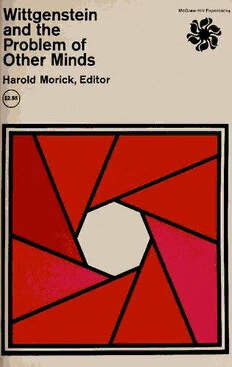
Wittgenstein And The Problem Of Other Minds PDF
Preview Wittgenstein And The Problem Of Other Minds
Wittgenstein and the Problem of Other Minds Harold Morick, Editor WITTGENSTEIN AND THE PROBLEM OF OTHER MINDS WITTGENSTEIN AND THE PROBLEM OF OTHER MINDS Edited by Harold Morick State University of New York at Albany McGraw-Hill Book Company New York Toronto London Sydney Copyright © 1967 by McGraw-Hill, Inc. All Rights Reserved. Printed in the United States of America. No part of this publication may be reproduced, stored in a retrieval system, or transmitted, in any form or by any means, electronic, mechanical, photo- copying, recording, or otherwise without the prior written permission of the publisher. Library of Congress Catalog Card Number: 67-17201 45678910 MU MU 7654 ISBN 07-043118 ACKNOWLEDGMENTS Grateful acknowledgment is hereby made to the authors and publishers for permission to reprint the selections in this book. “Critical Notice of Wittgenstein’s Philosophical Investigations” is reprinted from Mind (LXIII, No. 249, 1954) by permission of the editor and P. F. Strawson. “Wittgenstein’s Philosophical Investigations” is reprinted from Knowledge and Certainty: Essays and Lectures by Norman Malcolm, © 1963, with the permission of Prentice-Hall, Inc., Englewood Cliffs, N. J., and the author. “Can There Be a Private Language?” is reprinted from The Concept of a Person and Other Essays by A. J. Ayer (1963), by permission of Mac- millan and Co., Ltd., The Macmillan Company of Canada, Ltd., St. Mar- tin’s Press, Inc., and the author. “Two Arguments Against a Private Language” is reprinted from The Journal of Philosophy (LXII, No. 17, 1965) by permission of the editor and Moreland Perkins. The excerpt (“Section D”) from “Wittgenstein’s Lectures in 1930-1933” by G. E. Moore is reprinted from Mind (LXIII, 1954) by permission of the editor. “Persons” is reprinted from Minnesota Studies in the Philosophy of Sci- ence, Vol. II, edited by Herbert Feigl, Michael Scriven, and Grover Maxwell, © 1958, University of Minnesota, with the permission of the University of Minnesota Press and P. F. Strawson. “Wittgenstein’s Conception of a Criterion” is reprinted from The Phil. osophical Review (Vol. LXXI, No. 4, 1962) by permission of the editor and Carl Wellman. “Operationalism and Ordinary Language: A Critique of Wittgenstein” is reprinted from the American Philosophical Quarterly (Vol. 2, No. 4, 1965) by permission of the editor and of the authors, C. S. Chihara and J. A. Fodor. “Could Sensuous Experiences Occur Apart From an Organism?” and “The Fallacy of Cogito Ergo Sum” are reprinted from Mental Acts by Peter T. Geach (1957), by permission of Routledge & Kegan Paul Ltd., Humani- ties Press, Inc., and the author. “The Concept of Dreaming” is reprinted from Dreaming by Norman Mal- colm (1959), by permission of Routledge & Kegan Paul Ltd., Humanities Press, and the author. To my Mother and Father PREFACE THE ESSAYS in this book include not only several contem- porary classics, but also some of the best recent writings which deal with the title topic. These have been selected and arranged with the intention of providing a general introduction to Witt- genstein’s later philosophy, of assisting the reader in following what Wittgenstein says about other minds in his notoriously dificult Philosophical Investigations, of presenting leading ana- lytic philosophers’ evaluations of his work on this subject, and of giving a sense of the broader implications of the Wittgen- steinian approach to the other-minds problem. Of course, one need not read the selections either in the order given nor from the perspective of the other-minds problem alone. However, this sequence and point of view are felicitous for someone who is just starting to study the Investigations, since so much of Witt- genstein’s philosophical psychology revolves about this problem. The book is divided into three parts. The first contains the only concise critical exposition in existence treating all the major aspects of Wittgenstein’s later philosophy—Strawson’s vil viii Preface critical review of the Investigations. In charting the main lines of thought in Wittgenstein’s major work, this essay provides the necessary background for understanding his treatment of the problem of other minds. The second and largest section is meant to give a representa- tive characterization of Wittgenstein’s many-sided attack on philosophical skepticism about other minds. First Malcolm gives a panoramic but detailed picture of Wittgenstein’s arguments against the skeptical view of other minds. (The final section of the essay is a discussion of part of Strawson’s “Critical Notice.” ) He devotes special attention to the celebrated private language issue, with which Ayer is exclusively concerned in Selection III. On this subject, Malcolm is perhaps the staunchest defender of Wittgenstein, while Ayer is without question his most famous critic. These first three selections appeared in 1954, within a year of the publication of the Investigations. Writing more than a decade later, Perkins makes fundamental contributions in Selection IV toward resolving the issue. In the next two essays we are concerned with Wittgenstein’s thoughts in the early 1930s, which greatly aid in understanding his more mature but more elusive remarks in the Investigations. In Selection V, Moore provides an invaluable supplement to Wittgenstein’s published writings, for his aim here is to give an accurate transcription of Wittgenstein’s views during the early years of his later period. In Selection VI, Strawson begins by attacking those of Wittgenstein’s ideas concerning persons and the ownership of experiences which Moore reports. Of course, this essay is famous for Strawson’s development of a highly original solution to the other-minds problem and related ones in the philosophy of mind. Yet Strawson’s own view does de- velop the Wittgensteinian idea of behavior being a criterion for inner states—the idea of a logical or conceptual connection be- tween states of consciousness and their behavioral manifesta- tions. Wittgenstein’s conception of this connection is the difficult but rewarding subject of the section’s final two essays. Both Wellman and Chihara-Fodor give detailed explications of Witt- genstein’s conception of a criterion and also criticize it. (One
